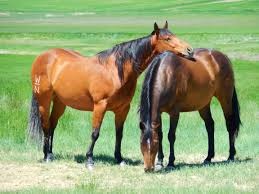
Effects of repeated regrouping on behaviour and injuries
In natural conditions, horses live in relatively stable harem groups. However, domestic horses often face social challenges due to changes in living environment and social groups. Little is known about how repeated regrouping affects the horse’s behaviour and if the horses may adapt to regrouping. This study aimed to investigate the effect of weekly regrouping on social behaviour and injuries in young female horses that were familiar to each other.
Forty-five horses were randomly assigned into two groups; Stable (seven groups of three horses) or Unstable (eight groups of three horses). The experiment lasted seven weeks, where the horses in the stable groups remained in the same group, while in the unstable groups one horse was exchanged between each group each week. Social interactions were recorded regularly after each regrouping and injuries were also scored.
The results show that group instability caused by weekly regroupings led to an increase in the amount of agonistic behaviour. Furthermore, the level of play was more variable in the unstable groups. However, no significant difference in the amount of injuries was found between the groups, and no large injuries or lameness was seen. To conclude, the frequency of the agnostic interactions immediately after regrouping did not decrease during the experiment, showing that horses do not appear to adapt to regrouping.
Expert opinion by Els Smet
This experiment was done with horses that were familiar to each other, and different results can be found when regrouping horses that do not know each other. However, we can conclude that the behaviour of young horses is affected by group management.
> From: Christensen et al., Appl Anim Behav Sci 133 (2011) 199-206. All rights reserved to Elsevier. Click here for the online summary.


